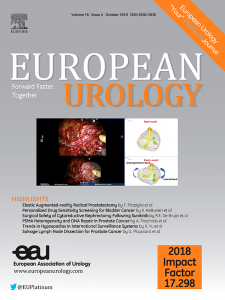Avelumab一线维持治疗晚期尿路上皮癌:JAVELIN膀胱100试验在非内脏或单纯淋巴结疾病患者中的长期结果
IF 25.3
1区 医学
Q1 UROLOGY & NEPHROLOGY
引用次数: 0
摘要
在JAVELIN膀胱100随机3期试验(N = 700)中,avelumab一线维持加最佳支持治疗(BSC)显著延长了总生存期(OS;在一线铂基化疗(PBC)后无进展的晚期尿路上皮癌(aUC)患者中,主要终点)和无进展生存期(PFS)与BSC单独治疗相比。在这里,我们报告了随机分组时PBC开始时非内脏转移(包括骨转移)或仅淋巴结疾病的探索性分析。非内脏转移患者(n = 318)与对照组相比,avelumab的中位OS为31.4 vs 17.1个月(风险比[HR], 0.60[95%可信区间{CI}, 0.45-0.79]),仅淋巴结疾病患者(n = 102)的中位OS为31.9 vs 22.7个月(HR, 0.86 [95% CI, 0.51-1.47])。在非内脏转移的患者中,无论对PBC或接受的PBC方案的反应如何,使用avelumab都观察到延长的OS。PFS分析在所有亚组中均倾向于avelumab优于对照组。亚组中与阿维鲁单抗相关的不良事件发生率相似。局限性包括样本量小和分析的探索性。总体而言,探索性分析表明,在一线pbc治疗的无进展患者中,对于非内脏转移或仅淋巴结疾病的aUC患者,avelumab维持是有效的,并且具有可控的毒性。本文章由计算机程序翻译,如有差异,请以英文原文为准。
Avelumab First-line Maintenance for Advanced Urothelial Carcinoma: Long-term Outcomes from the JAVELIN Bladder 100 Trial in Patients with Nonvisceral or Lymph Node–only Disease
In the JAVELIN Bladder 100 randomized phase 3 trial (N = 700), avelumab first-line maintenance plus best supportive care (BSC) significantly prolonged overall survival (OS; primary endpoint) and progression-free survival (PFS) versus BSC alone in patients with advanced urothelial carcinoma (aUC) without progression after first-line platinum-based chemotherapy (PBC). Here, we report exploratory analyses of subgroups with nonvisceral metastases at the start of PBC (including bone metastases) or lymph node–only disease at randomization. The median OS with avelumab versus control in patients with nonvisceral metastases (n = 318) was 31.4 versus 17.1 mo (hazard ratio [HR], 0.60 [95% confidence interval {CI}, 0.45–0.79]), and in patients with lymph node–only disease (n = 102), it was 31.9 versus 22.7 mo (HR, 0.86 [95% CI, 0.51–1.47]). In patients with nonvisceral metastases, prolonged OS was observed with avelumab irrespective of the response to PBC or PBC regimen received. PFS analyses favored avelumab over control in all the subgroups. Incidences of avelumab-related adverse events were similar across the subgroups. Limitations include small sample sizes and the exploratory nature of analyses. Overall, exploratory analyses suggest that in first-line PBC-treated patients without progression, avelumab maintenance is effective and has a manageable toxicity profile in patients with aUC who have nonvisceral metastases or lymph node–only disease.
求助全文
通过发布文献求助,成功后即可免费获取论文全文。
去求助
来源期刊

European urology
医学-泌尿学与肾脏学
CiteScore
43.00
自引率
2.60%
发文量
1753
审稿时长
23 days
期刊介绍:
European Urology is a peer-reviewed journal that publishes original articles and reviews on a broad spectrum of urological issues. Covering topics such as oncology, impotence, infertility, pediatrics, lithiasis and endourology, the journal also highlights recent advances in techniques, instrumentation, surgery, and pediatric urology. This comprehensive approach provides readers with an in-depth guide to international developments in urology.
 求助内容:
求助内容: 应助结果提醒方式:
应助结果提醒方式:


